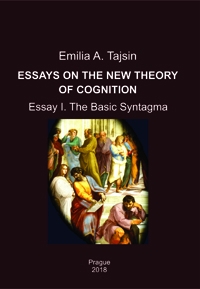Tajsin E. A. Essays on the new theory of cognition

Tajsin E. A. Essays on the new theory of cognition
. Essay I. The Basic Syntagma. 2nd edition. – Prague : Vědecko vydavatelské centrum «Sociosféra-CZ», 2018. – 162 с. With their numerous derivatives, positivism and existentialism became the main philosophical trends at the end of the XIXth and beginning of the XXIst centuries. Due to their shared neo-Kantian origins they coexist in unity, and at the same time they are contradictory as “philosophy of science” and “philosophy of life”. The drama of their relationship determined the physiognomy of decades “after the linguistic turn” no less than the well-known contradiction of Marxist doctrine and the opponents of this doctrine. The cultural and ideological background of the unfolding drama should be qualified as postmodernism, followed by the extrusion and displacement of philosophical scientific classical theory of knowledge, which leads to an underestimation or the loss of a significant number of functions of philosophy, primarily cognitive, as well as reflective-critical.
This book introduces the new theory of cognition.
The path of cognition cannot be traversed or even be started without the almost innate belief in the knowability of the phenomena and laws of reality. Without this initial faith our only destiny would have been skepticism. This book’s author aims to offer a new theory of knowledge, which would allow for advances of recent decades, while remaining true to many classical principles. It is based on the postulate of the unity of the doctrine of being, ontology, and doctrine of knowledge, gnoseology which is general theory of knowledge, and, coincidentally, of that which is their subject.
Presentation of the theory requires linearity. Paying tribute to the tradition, it starts with ontology, but in a special way – the ontology called “existential”, non-objectivist, in which the knower is present not “out of” the subject’s being, as a nature explorer, and not parallel to it, like a mirror, but in the immanent manner. The knowing agent finds oneself in the situation of here-and-now-being-consciousness, “Da-bewuβt-sein”. The theory presented is a philosophical inquiry into the “here-and-now-being-consciousness” – as the only real premise of cognition theory adequate to human being.
Perhaps this megalithic concept is the subject of future philosophy. The author believes that existential materialism is not just one of the logically possible trends of philosophical thought, but a natural, necessary and substantial direction in relation to all others: “normal” philosophizing.
In this treatise, then, not only the specifics of (ideal) image are explained, but also the characteristic features of what is reflected in this image, the object of which reflection is interacting with a person. This principle is correlated with the fundamental gnoseological syntagma – reasoning of highest valence concerning the absolute and relative nature of knowledge.
Moreover, not only is the problem on the issue of the dyad “subject – object” as the basic structure of the cognitive relation solved, but also the triad of “subject – language – object” is demonstrated, including the basic means of knowledge into this scheme. The new gnoseology is founded, too, on the factual basis of general scientific knowledge (semiotics) and data of special disciplines (linguistics, logic, literature, geography, mathematics).
The result is an offered solution of the fundamental question of any cognition theory – the problem of localization, the nature and essence of truth. The book includes four essays framed into one treatise. This publication introduces the first one: The Basic Syntagma.
The publication is intended for readers who are deeply interested in philosophy.













 Философия
Философия
 Социология
Социология
 Искусствоведение
Искусствоведение
 История
История
 Культурология
Культурология
 Медицина
Медицина
 Педагогика
Педагогика
 Политология
Политология
 Право
Право
 Психология
Психология
 Техника
Техника
 Филология
Филология
 Экономика
Экономика
 Информатика
Информатика
 Экология
Экология
 Религиоведение
Религиоведение